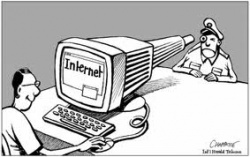“Great Chinese LAN”的版本间的差异
来自China Digital Space
| 第3行: | 第3行: | ||
[[File:computerscope.jpg|250px|thumb|left]]A local area network (LAN) is a computer network covering a small physical area, like a home, office, or small groups of buildings. The “Great Chinese LAN” sarcastically refers to the Internet as it exists in China. | [[File:computerscope.jpg|250px|thumb|left]]A local area network (LAN) is a computer network covering a small physical area, like a home, office, or small groups of buildings. The “Great Chinese LAN” sarcastically refers to the Internet as it exists in China. | ||
| − | Over the years, as it became apparent that the Internet was a space in which people could freely exchange ideas, the Chinese government | + | Over the years, as it became apparent that the Internet was a space in which people could freely exchange ideas, the Chinese government began to restrict which overseas websites could be viewed from Chinese servers. The [[Great Firewall of China]] filters certain webpages and entire websites from view. |
| − | In addition to censoring content deemed sensitive, the Great Firewall blocks | + | In addition to censoring content deemed sensitive, the Great Firewall blocks [http://chinadigitaltimes.net/2009/03/youtube-blocked-in-china-official-says-video-fake/ YouTube], [http://chinadigitaltimes.net/2009/06/chinese-censors-cut-off-twitter-hotmail-and-flickr/ Twitter], [http://chinadigitaltimes.net/2009/08/the-battle-to-scale-the-great-firewall-of-china/ Facebook], and other platforms that have been or could be used by activists and dissidents to connect, spread information, and organize protests. |
| − | As a result, Chinese-based companies such as [http:// | + | As a result, Chinese-based companies such as [http://chinadigitaltimes.net/2010/02/the-man-behind-the-chinese-equivalent-of-youtube/ Youku], [http://chinadigitaltimes.net/2011/06/fail-whale-meet-the-chinese-dragon/ Weibo], and [http://chinadigitaltimes.net/2011/01/the-facebooks-of-china/ RenRen] have grown in the space left by those blocked websites, providing similar services, but with harsher censorship measures and surveillance. The landscape of the Chinese Internet has therefore become much like a LAN, with China’s netizens restricted for the most part to China-based, government-regulated websites and barred from many international platforms. |
| + | |||
| + | <feed url="feed://chinadigitaltimes.net/china/great-firewall/feed/" entries="5"> | ||
| + | |||
| + | == [{PERMALINK} {TITLE}] == | ||
| + | |||
| + | '''{DATE}, by {AUTHOR}''' | ||
| + | </feed> | ||
[[Category: Grass-Mud Horse Lexicon]] | [[Category: Grass-Mud Horse Lexicon]] | ||
2013年5月14日 (二) 18:20的版本
大中华局域网 (Dà Zhōnghuá Júyùwǎng): Great Chinese LAN
A local area network (LAN) is a computer network covering a small physical area, like a home, office, or small groups of buildings. The “Great Chinese LAN” sarcastically refers to the Internet as it exists in China.
Over the years, as it became apparent that the Internet was a space in which people could freely exchange ideas, the Chinese government began to restrict which overseas websites could be viewed from Chinese servers. The Great Firewall of China filters certain webpages and entire websites from view.
In addition to censoring content deemed sensitive, the Great Firewall blocks YouTube, Twitter, Facebook, and other platforms that have been or could be used by activists and dissidents to connect, spread information, and organize protests.
As a result, Chinese-based companies such as Youku, Weibo, and RenRen have grown in the space left by those blocked websites, providing similar services, but with harsher censorship measures and surveillance. The landscape of the Chinese Internet has therefore become much like a LAN, with China’s netizens restricted for the most part to China-based, government-regulated websites and barred from many international platforms.
<feed url="feed://chinadigitaltimes.net/china/great-firewall/feed/" entries="5">
[{PERMALINK} {TITLE}]
{DATE}, by {AUTHOR} </feed>





